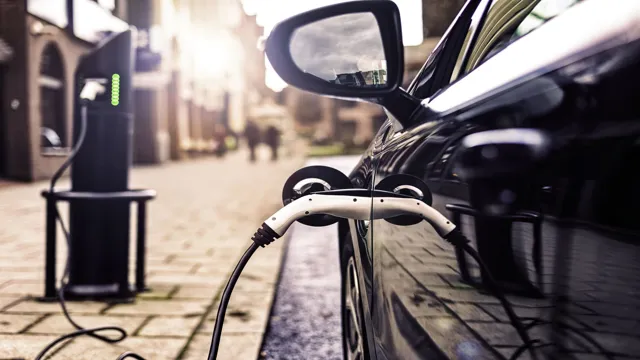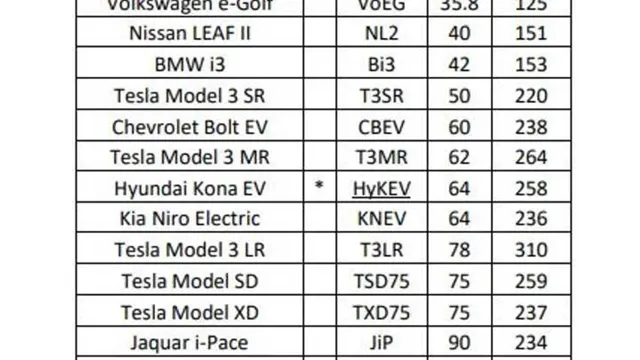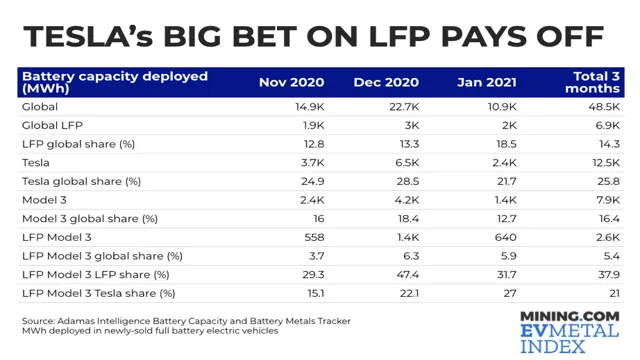Rev Up Your Decision Making: Comparing kWh Battery Capacity in Electric Cars
Electric cars are becoming increasingly popular as more people recognize the need to reduce their carbon footprint. However, when choosing an electric car, one of the most important factors to consider is its kWh, or kilowatt-hour rating. This refers to how much energy the car’s battery can store, and it affects the range of the vehicle.
Comparing the kWh of different electric cars can be a daunting task, but with a little bit of knowledge, it’s possible to make an informed decision and select the electric car that meets your needs. In this blog post, we’ll take a closer look at how to compare the kWh of electric cars so that you can make an informed decision.
Introduction
If you’re considering purchasing an electric car, you may be wondering how to compare kWh battery capacity across different models. The kWh (kilowatt-hour) rating refers to how much energy the battery can store, impacting the car’s range between charges. A higher kWh rating typically means a longer range.
However, it’s important to keep in mind that factors such as driving style and weather conditions can also impact the range. Additionally, it’s worth noting that different electric cars also have varying levels of efficiency, affecting how far they can travel on the same amount of energy. Comparing kWh battery capacity is just one piece of the puzzle when selecting an electric car, but it can provide valuable insight into how far you can go on a single charge.
Why kWh Matters in Electric Cars
Electric Cars kWh Importance Electric cars are becoming increasingly popular, but what exactly is kWh and why is it important? The abbreviation kWh stands for kilowatt-hour, which denotes the amount of energy an electric car battery can store. To put it simply, a larger kWh battery capacity allows an electric car to travel further on a single charge. The reason kWh matters so much in electric cars is because it heavily influences the car’s range, performance, and overall efficiency.
In other words, the higher the kWh capacity, the longer the car can go on a single charge, resulting in less charging stops and more convenience. Understanding kWh is critical for anyone looking to purchase an electric car, as it can heavily impact their driving experience.

Top Electric Cars by kWh
If you’re in the market for an electric car and want to compare kWh battery capacity, there are many options to choose from. Starting at the top, the current leader in kWh battery capacity is the Tesla Model S with up to 100 kWh. Following closely behind is the Model X with up to 95 kWh and the Model 3 with up to 75 kWh.
Other popular electric cars with substantial kWh battery capacity include the Audi e-tron with a 95 kWh battery, the Jaguar I-PACE with a 90 kWh battery, and the Porsche Taycan with up to 94 kWh. It’s important to note that while kWh battery capacity is an important factor to consider when purchasing an electric car, it’s not the only one.
Factors such as range, charging time, and price should also be taken into account. Ultimately, the best electric car for you depends on your specific needs and preferences.
Tesla Model S: 100 kWh
The Tesla Model S, one of the most popular electric cars on the market, boasts a whopping 100 kWh battery capacity. That’s a lot of power packed into one vehicle, allowing drivers to travel long distances without needing to stop for a recharge. And while the Model S may be the king of kWh for now, there are plenty of other electric vehicles on the market with impressive battery capacities as well.
In fact, as more and more consumers turn to electric cars in order to reduce their carbon footprint and save money on gas, we’re likely to see even more advancements in battery technology in the years to come. So whether you’re a die-hard Tesla fan or just excited about the future of electric cars, you can rest assured that the technology is only getting better and more accessible over time.
Porsche Taycan: 93.4 kWh
When it comes to electric cars, one of the biggest factors to consider is the power capacity of its battery. This is often measured in kilowatt-hours (kWh), which determines how far a car can go on a single charge. One of the top electric cars based on kWh is the Porsche Taycan, which boasts a massive 9
4 kWh battery capacity. This allows the Taycan to drive up to 200 miles on a single charge, making it a popular choice for drivers who prioritize range and power. Other electric cars with high kWh capacities include the Tesla Model S (up to 100 kWh) and the Audi e-tron (up to 95 kWh).
However, it’s important to note that higher kWh capacities come at a higher cost and also result in a longer charging time. Ultimately, the best electric car for you will depend on your individual needs and preferences, such as driving range, cost, and charging capabilities.
Audi e-tron: 95 kWh
One of the most exciting developments in the automotive industry over the past few years has been the emergence of electric cars. With more and more drivers looking for eco-friendly and sustainable ways to travel, it’s no wonder that electric vehicles are quickly growing in popularity. When it comes to comparing the top electric cars, one important factor to consider is the battery size, typically measured in kilowatt-hours (kWh).
The Audi e-tron is currently one of the frontrunners, boasting an impressive 95 kWh battery. This allows for a range of up to 222 miles on a single charge, making it a great option for longer journeys. Other top electric cars by kWh include the Tesla Model S (up to 100 kWh), the Porsche Taycan (up to 9
4 kWh), and the Mercedes-Benz EQS (up to 108 kWh). With more automakers entering the electric vehicle market all the time, it will be interesting to see how these numbers continue to grow and evolve.
Chevy Bolt: 66 kWh
The Chevy Bolt is a top-performing electric car, with a battery capacity of 66 kWh. When it comes to electric cars, the kWh rating is one of the most significant factors to consider, as it determines the vehicle’s driving range. The Chevy Bolt’s impressive 66 kWh battery pack offers a driving range of up to 259 miles on a single charge.
This makes it an excellent option for those who drive long distances and need a reliable vehicle that can get them to their destination without having to stop and recharge frequently. Along with its impressive range, the Chevy Bolt also delivers impressive acceleration and a smooth, comfortable ride. It’s a well-rounded electric car that checks all the boxes for both eco-conscious and practical consumers.
The Chevy Bolt has successfully established itself as one of the top electric cars on the market today, offering a competitive edge with its high battery capacity and excellent driving range.
How to Choose the Right kWh
When choosing the right kWh for your electric car battery, there are a few things to consider. Firstly, you should take into account the range you will need for your daily driving. If you have a longer commute or plan on taking road trips, you may want to opt for a higher kWh battery.
It’s also important to consider the charging options available in your area and how frequently you will need to charge your car. Additionally, you should compare the kWh of different electric car models to find one that fits your needs and budget. Keep in mind that a higher kWh battery will typically cost more upfront, but can save you money in the long run by reducing the frequency of charging.
Overall, it’s important to do your research and choose a kWh that works for your lifestyle and driving habits.
Considering Driving Range
When considering the driving range of your electric vehicle, one of the most important factors to consider is the kWh or kilowatt-hour. This refers to the amount of energy stored in your EV’s battery and can have a significant impact on how far you can travel before needing to recharge. Choosing the right kWh for your EV depends on a variety of factors, including your typical driving habits and daily commute distance.
Higher kWh batteries typically provide greater driving ranges, but they can also be more expensive. It’s important to strike a balance between cost and range that works best for your needs. Ultimately, it’s best to do your research and consult with an expert to determine the optimum kWh range for your electric vehicle.
Considering Price
When considering the price of electricity, one of the most important factors is the amount of kilowatt hours (kWh) you use. Choosing the right kWh plan is essential to keeping your energy costs down. It’s important to keep in mind that the price per kWh can vary depending on the time of day and the season.
For instance, electricity demand tends to be higher during peak hours, causing prices to rise. Therefore, if you’re able to shift your energy consumption to off-peak hours, you can save money on your bill. Another way to choose the right kWh is by looking at your past energy usage.
This can give you an idea of how much you typically use, which can help you select the best plan for your needs. And don’t forget to compare prices from different providers to ensure you’re getting the best value for your energy usage. By taking these factors into consideration, you’ll be able to choose the right kWh plan and keep your energy costs under control.
Conclusion
In conclusion, when it comes to comparing the kWh battery in electric cars, size does matter. A larger battery capacity can provide more range and power, but it also means a heftier price tag. It’s important to find the right balance between size, cost, and individual needs.
Ultimately, the kWh battery is the driving force behind the electric car revolution, and as technology continues to improve, we can expect even more impressive advancements in the future. So charge up your batteries and get ready to hit the road in style!
FAQs
What is the difference between kWh and Ah when it comes to electric car batteries?
kWh represents the amount of energy a battery can store, while Ah indicates its capacity. So, a higher kWh battery would store more energy than a higher Ah battery.
Which electric car models have the highest kWh batteries currently in the market?
Tesla Model S and Model X currently have the highest kWh batteries available for electric cars at 100 kWh.
How does the kWh of an electric car battery affect its range?
Generally, the higher the kWh of the battery, the longer the range of the electric car.
Can the age of the electric car battery affect its kWh capacity?
Yes, the age of the battery affects its kWh capacity. As the battery degrades over time, its capacity to store energy decreases, leading to a reduction in its kWh output.




